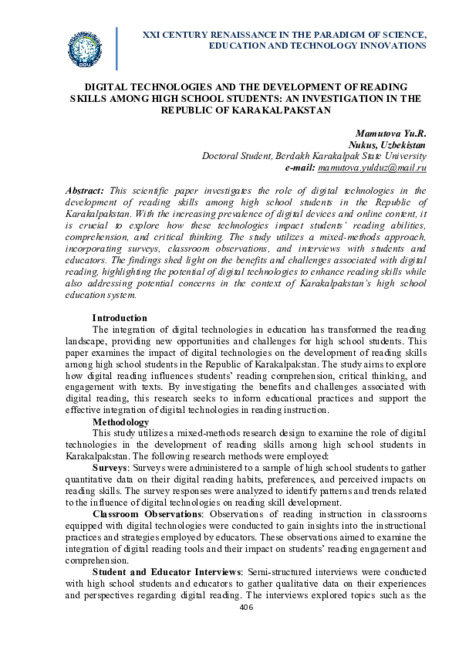
XXI CENTURY RENAISSANCE IN THE PARADIGM OF SCIENCE,
EDUCATION AND TECHNOLOGY INNOVATIONS
406
DIGITAL TECHNOLOGIES AND THE DEVELOPMENT OF READING
SKILLS AMONG HIGH SCHOOL STUDENTS: AN INVESTIGATION IN THE
REPUBLIC OF KARAKALPAKSTAN
Mamutova Yu.R.
Nukus, Uzbekistan
Doctoral Student, Berdakh Karakalpak State University
e-mail:
mamutova.yulduz@mail.ru
Abstract:
This scientific paper investigates the role of digital technologies in the
development of reading skills among high school students in the Republic of
Karakalpakstan. With the increasing prevalence of digital devices and online content, it
is crucial to explore how these technologies impact students’ reading abilities,
comprehension, and critical thinking. The study utilizes a mixed-methods approach,
incorporating surveys, classroom observations, and interviews with students and
educators. The findings shed light on the benefits and challenges associated with digital
reading, highlighting the potential of digital technologies to enhance reading skills while
also addressing potential concerns in the context of Karakalpakstan’s high school
education system.
Introduction
The integration of digital technologies in education has transformed the reading
landscape, providing new opportunities and challenges for high school students. This
paper examines the impact of digital technologies on the development of reading skills
among high school students in the Republic of Karakalpakstan. The study aims to explore
how digital reading influences students’ reading comprehension, critical thinking, and
engagement with texts. By investigating the benefits and challenges associated with
digital reading, this research seeks to inform educational practices and support the
effective integration of digital technologies in reading instruction.
Methodology
This study utilizes a mixed-methods research design to examine the role of digital
technologies in the development of reading skills among high school students in
Karakalpakstan. The following research methods were employed:
Surveys
: Surveys were administered to a sample of high school students to gather
quantitative data on their digital reading habits, preferences, and perceived impacts on
reading skills. The survey responses were analyzed to identify patterns and trends related
to the influence of digital technologies on reading skill development.
Classroom Observations
: Observations of reading instruction in classrooms
equipped with digital technologies were conducted to gain insights into the instructional
practices and strategies employed by educators. These observations aimed to examine the
integration of digital reading tools and their impact on students’ reading engagement and
comprehension.
Student and Educator Interviews
: Semi-structured interviews were conducted
with high school students and educators to gather qualitative data on their experiences
and perspectives regarding digital reading. The interviews explored topics such as the

XXI CENTURY RENAISSANCE IN THE PARADIGM OF SCIENCE,
EDUCATION AND TECHNOLOGY INNOVATIONS
407
benefits, challenges, and potential concerns associated with digital reading. The
qualitative data obtained from the interviews were analyzed to identify recurring themes
and provide rich insights into the topic.
Findings
Benefits of Digital Reading:
The findings reveal that digital technologies offer
various benefits for reading skill development, including increased access to diverse
texts, interactive features that enhance comprehension, and opportunities for
collaborative reading experiences.
Challenges in Digital Reading:
The study identifies challenges such as digital
distractions, difficulties in maintaining focus, and potential issues related to information
credibility and digital literacy skills.
Strategies for Effective Digital Reading Instruction:
The findings highlight the
importance of explicit instruction in digital reading strategies, the integration of
multimedia elements, and the development of critical evaluation skills to navigate digital
texts effectively.
Discussion
The discussion section provides a comprehensive analysis of the findings,
examining the implications for reading instruction in Karakalpakstan’s high schools. It
explores strategies to maximize the benefits of digital technologies while addressing the
identified challenges. The discussion also emphasizes the need for professional
development for educators to effectively integrate digital reading practices into their
instruction.
Conclusion
This scientific paper presents insights into the role of digital technologies in the
development of reading skills among high school students in the Republic of
Karakalpakstan. The study highlights the benefits, challenges, and instructional
considerations associated with digital reading. The findings contribute to the broader
conversation on digital literacy and inform educators, policymakers, and researchers
about effective practices to support students’ reading skill development in the digital age.

XXI CENTURY RENAISSANCE IN THE PARADIGM OF SCIENCE,
EDUCATION AND TECHNOLOGY INNOVATIONS
408
REFERENCES:
1.
Coiro, J., & Dobler, E. (2017). Exploring the online reading comprehension
strategies used by sixth-grade skilled readers to search for and locate information on the
Internet. Reading Research Quarterly, 52(4), 469-486.
2.
Hsieh, P. H., & Cho, Y. H. (2018). A systematic review of the effects of digital
reading on reading motivation and reading comprehension. Educational Research
Review, 25, 35-50.
3.
Linderholm, T., & Westman, S. (2019). Digital reading in school: Practices,
motivations, and challenges. Journal of Adolescent & Adult Literacy, 63(1), 45-55.
4.
Moss, B., & Lapp, D. (2017). Teaching new literacies in grades 4-6: Resources for
21st-century classrooms. Guilford Press.
5.
National Council of Teachers of English. (2013). NCTE Framework for 21st
Century
Curriculum
and
Assessment.
Retrieved
from
https://ncte.org/library/NCTEFiles/Resources/PolicyResearch/Frameworkfor21stCentury
CurriculumAssessment.pdf
6.
Penuel, W. R., Gallagher, D. J., & Moorthy, S. (2017). Creating research–practice
partnerships in education. Harvard Education Press.
7.
Reinking, D., & Watkins, J. (2009). Handbook of literacy and technology:
Transformations in a post-typographic world. Routledge.
8.
Warschauer, M., & Matuchniak, T. (2010). New technology and digital worlds:
Analyzing evidence of equity in access, use, and outcomes. Review of Research in
Education, 34(1), 179-225.






